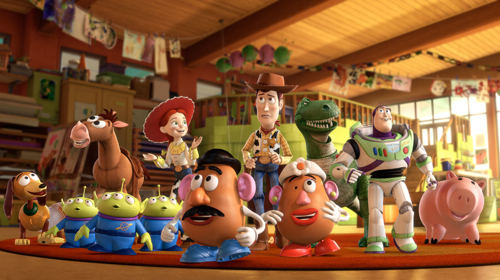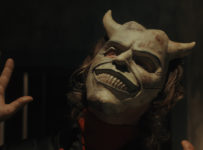
Toy Story 3 is a great argument against objectivity in the cinema. How can we be objective, when everything that we take out of a movie is informed by who we are, and who we are is at least partially informed by what we see in the movies?
Toy Story 3 is an example to me of a perfect movie. It is not a perfect movie for everyone. I don't care about everyone and what they think of this movie, I care what I think of it. Does that make me a bad critic, even as an amateur? No, that is how the system works. A movie like Toy Story 3 is one that can be received as a personal gift from Pixar to the viewer, as I did. To take it any other way, to view it as "just another movieâ€, that's not my style at all.
Toy Story 3, to me, is love. It is the distillation of fifteen years of Pixar into a single wondrous movie. That is more than enough for me. If I didn't view ratings for movies as arbitrary and silly, I would give it full marks. There is no definitive review, but Toy Story 3 is a marvel in my eyes.
Buzz, Woody and the gang are Andy's beloved toys. However, when it comes time for Andy to go to college, he has to decide what will become of them after years in his toy box. Due to a series of mishaps, the toys are donated to Sunnyside Daycare, where all is not as it seems.
Toy Story 3 is the result of many years of fine-tuning of Pixar's craft. Having rewatched the first two as recently as last weekend, I can safely say that they were both good movies, but they were prototypical, mere suggestions of the studio that would go on to make The Incredibles, Ratatouille, Wall-E and Up. Conversely, they did not begin to suggest the pall cast by the lazy and self-indulgent of Cars.
Since 2007's Ratatouille, the annual release of a Pixar film has been something to look eagerly forward to; without fail, each offering has comfortably fit amongst the best of the year. Toy Story 3 is no exception: it is an example of a sequel done right, of a saga ended correctly, and of a franchise uncompromised.
Character has always been key to Toy Story, with the surprise being that the ostensible hero, Woody, is basically an egomaniacal jerk to the very end. He learns important lessons, he cares about his friends, but most of all he cares for himself. This purity of character has been preserved across the board in Toy Story 3, not just with Woody but with every recurring character.
Time has been a matter of attrition for the toys of Andy's room, leaving a core cast of the best and funniest of his collection. One of the absences seems genuinely heartbreaking, but we're not allowed to dwell on it: instead, we are expected to move on, just as Andy is expected to. Sometimes it's just not that easy. The Toy Story movies make me feel guilty because I never cared as much for a toy as Andy cares for Woody, Buzz et al. None of my toys were ever as cool as them. The Ren doll I used to sleep with has nothing on any of these guys … especially not Mr. Pricklepants!
So there's the purity of character. There's also the purity of the prison movie, of the great escape, of the power of friendship and of true romance between fashion dolls with ascots. I can't think of a single misstep made in Toy Story 3. It has the best and most deliberately bombastic opening sequence of the trilogy, spectacular in its scale and hilarious in its content. The climax, by contrast, is far more “real” and infinitely more dangerous.
Toy Story 3 also plays host to the single greatest deus ex machina in my cinematic experience. Basically every sequence in the film is delightful in some way or another. There is no single comic or action centerpiece, because the film doesn't weight any particular scene above another. It's all out, all the time. Some of the film is legitimately funny to the point that I was in tears of laughter, and some of the action is dramatic to such a degree that I actually felt that the toys were in some sort of danger and seriously needed each other.
More than that, I sincerely cared about the fate of all of them. Although they haven't been in my thoughts for much of the last fifteen years, I felt a little bit like Andy: I remembered the good times together, I was sad to see them go, but ultimately all of our mutual friends have moved on to a better place.
What Toy Story 3 lacks is montage. It has an opening credit sequence that perfectly portrays a life of play, but at no point does it fall into the momentum killing trap of Toy Story 2's "When She Loved Me†sequence. With no bloat, constant inventiveness and more than a few surprises, first time solo director (but long time Pixar player) Lee Unkrich has crafted a tight and marvelous movie.
Judgment of the youth of today for preferring tween culture and video games to the power of imaginative play is kept to a merciful minimum, with the limited exposure of Molly and her air of ten-year-old boredom. Toy Story 3 offers no real moral message apart from the power of friendship and the cohesiveness of a family unit in the face of adversity and unyielding dictatorship.
Perhaps the only real problem with Toy Story 3 is that it's not strictly made for children, although they will enjoy it: it's made for the young adults who saw the first Toy Story. I criticized Cars when I saw it because it was made for an audience who would have none of the nostalgia that was required to enjoy Lasseter's intense tunnel vision. When I consider myself to be the key demographic, that objectivity is again discarded.
Toy Story 3 was made for me. You may share it, if you wish; we can all bask in its glory … and take my word for it, it is absolutely glorious. Toy Story 3 is triumph of both the animated and cinematic forms. In other words: a Pixar film.



Nice ass…cot.
So, lets extrapolate the PERFECT MOVIE IS PERFECT comment.
Can I just say that twilight does not deserve the millions of gold class listings it received. THAT is why I had to sit in a theatre filled with tweens and idiots sitting next to me who kept on checking their phones (with the glare on the screen hitting me in the face). I was inclined to whip out my own iphone and bash them over the head with it.
ANYWAYS.
Twilight also brought with it the ~dramatic!~ use of the fog machine. I can imagine a team meeting with the Event Cinema staff (in my mind they all look like the pimply kid from the simpsons, mixed with upchuck from Daria) brainstorming about what would make the Twilight release “special” . Clearly the best they could come up with, was the fog machine. And can I just tell you, THEY WERE DOING IT WRONG.
When you’re sitting in a cinema and you see “smoke” wafting from the closed doors, that then proceeds to fill the entire cinema, the logical conclusion is “OH SHIT THE CINEMA IS ON FIRE!!”. Is it not?
So beyond the dumbassery of the people who run the cinema, we were settled in to watch the movie.
No mention of Day and Night (not Knight and Day *shudder*) in your review? I always loved the pre show pixar clips and this one was as good as the rest.
Watching Toy Story was like a big dose of nostalgia – there’s Buzz and Woody (an honorable mention included for the toys left behind) and the movie was perfect. But then again, Hanks can do no wrong, even if he is a CGI toy sheriff.
As an adult, I was impressed by the large differences in image quality and just sheer awe over what computers can do these days (and will continue to improve, I’m sure with each new film). Toy Story was cutting edge way back in ’95, and it continues to deliver in an “Avatar” age.
the 3d felt natural, and it wasn’t over the top.
The story itself was as you said, the classic mix of prison break and romance.
The the characters of the film that give it that extra pizazz included Keaton as Ken…. just amazing, the creepy baby, and of course the MONKEY. Dude, I don’t know about kids, but that screeching monkey is going to be haunting me for quite some time.
Spanish Buzz doesn’t get old either. That was a great touch.
I would have liked to have seen more of the new characters (buttercup etc) as I felt they were fresh and could have had some good moments, but considering the length of the film, I can understand using them sparingly.
The best scene of all (and the tearjerker for those who aren’t made of harder stuff, like myself) was the one between the little girl and Andy, as he does the final “play” with his mates before they go to a new home. Touching stuff.
And as we were leaving the cinema, my dad turned to me and said “AREN’T YOU GLAD YOU DIDNT THROW YOUR TOYS AWAY AND I KEPT THEM IN THE ATTIC!!?”
And thus concluded our Toy Story journey.
Now excuse me whilst I go back to DOWNEYPALOOZA…. Last night, Zodiac, today, I might go out and try to find Chaplin.